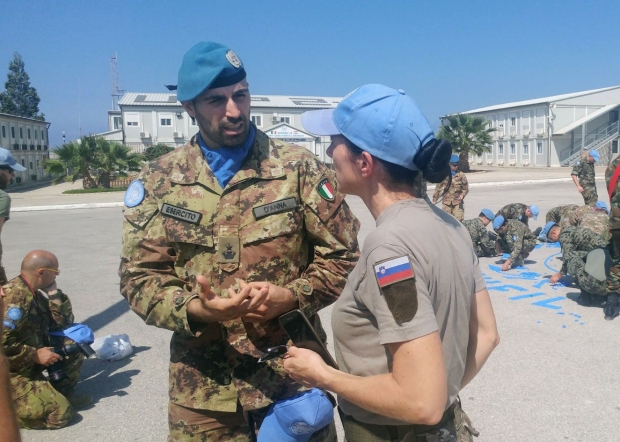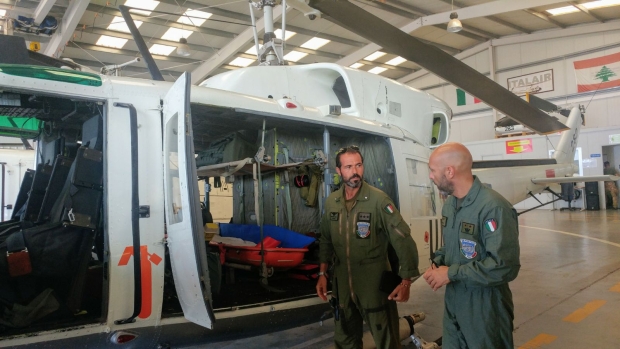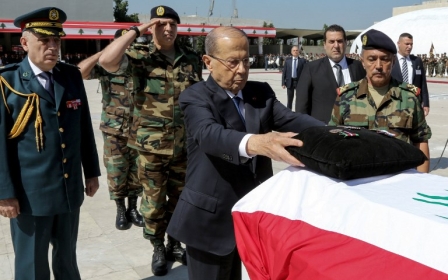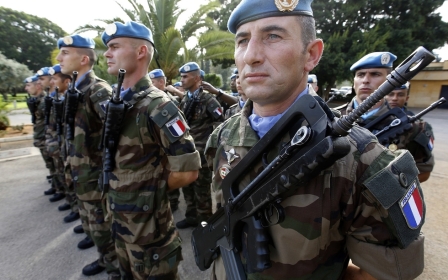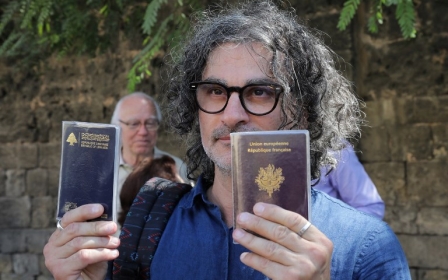'A vigilant eye': UN troops in Lebanon see no appetite for war
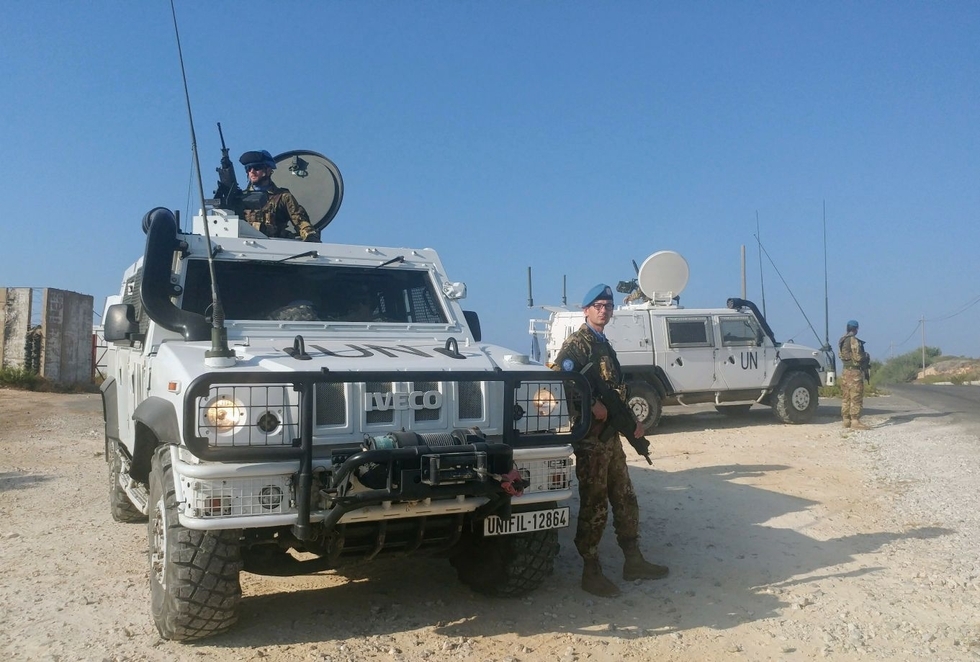
NAQOURA, Lebanon - If the Lebanese-Israeli conflict were a football match, UNIFIL peacekeepers would not be the referee.
"The UN is the referee," Italian Major Vincenzo D'Anna told Middle East Eye, on a coastal hill a few hundred metres from the Blue Line. "We just say, this happened; and you decide. We report everything. We are totally impartial and neutral."
The Blue Line is the improvised border between Lebanon and Israel and Syria's occupied Golan Heights. It is marked with minefields, imaginary lines between poles and occasional walls and fences.
The UN Interim Force in Lebanon (UNIFIL) monitors the volatile border and reports violations periodically to the Security Council. The troops pride themselves on helping maintain a rare long period of peace since the last war between the two countries, in 2006.
But they have recently come under fierce criticism from US ambassador to the UN, Nikki Haley, who has accused them of overlooking Hezbollah's violations.
In her most scathing attack on UNIFIL, Haley called the force's leader Major General Michael Beary "blind" to what is happening in Lebanon.
In response to Haley, UNIFIL spokesperson Andrea Tenenti told MEE last week that the peacekeepers have a "very vigilant eye".
There is no appetite for war between the various sides in south Lebanon, according to Tenenti.
"Eleven years of peace are a sign that nobody wants to change the situation in the south. There has been a commitment by the different parties to preserve the stability that we have been able to maintain for 11 years," he said.
Despite Washington's reservations, the UN Security Council voted unanimously to renew the force's mandate for one year on 30 August.
The renewal did not change the way UNIFIL works, but at Haley's request, the Security Council added language to the resolution pledging that the force will "take all necessary action" to stop violations.
As per Security Council Resolution 1701, which ended the 2006 war between Hezbollah and Israel, the Lebanese Iran-backed group cannot have weapons south of Litani River, about 20km from the border.
UNIFIL, however, is not authorised to militarily engage with the parties of the conflict.
If peacekeepers witness Hezbollah military activity in their area of operation, the most they can do is notify the Lebanese Armed Forces (LAF) and note the violation in their periodical reports to the Security Council.
Nor can the UN troops stop the almost daily violations of Lebanese airspace by Israeli jets.
D'Anna, the Italian UNIFIL major, said there are three main pillars to the force's mission:
- Monitoring the Blue Line and the area of operation.
- Training and assisting the LAF.
- Supporting the local population through various social and educational initiatives.
UNIFIL was created in 1978 when Israel invaded south Lebanon for the first time. The force was expanded after the 2006 war. It now has more than 10,000 troops from 41 different countries, although some nations have as few as one soldier in the force.
The top contributing countries are Indonesia, with 1,292 soldiers, followed by Italy with 1,085 peacekeepers.
'You cannot but respect them'
MEE visited two UNIFIL bases in south Lebanon on 18 September, witnessing the international cooperation between troops. For example, at an airbase at the border in Naqoura, Austrian and Italian soldiers were carrying out a joint firefighting and rescue exercise.
At Sector West's base in Chamaa, about 10km north of the border, Ghanaian, South Korean, Italian, Irish and Slovenian soldiers were tracing a UN logo with blue bottle caps, as three men in Lebanese army uniforms walked by.
The peacekeepers were participating in an event in the run-up to the International Day of Peace. UNIFIL had been collecting plastic bottles to sell them to a recycling company and donate the money to environmental organisations.
The Lebanese soldiers were heading to a fire observation course, where they were going to learn about describing the location of mortar targets.
D'Anna said the force's mission is sensitive. Hence, it takes six months of training, which includes cultural awareness, to be deployed to Lebanon for six months.
He said Rome is invested in the success of the mission.
"Lebanon is key to the success of peace in the Middle East."
D'Anna added that the local population understands the goal and purpose of the mission.
"They did a lot of good for us," Hana Alhusseini said of UNIFIL. She and her sister were selling pickled olives, jam and lemonade.
Alhusseini said everyone in the south is happy with the peace that has prevailed over the past decade. "It's calm here. No one messes with anyone," she told MEE.
At another kiosk, selling towels, aprons and purses, Hadil Ibrahim also praised the UN troops.
Ibrahim, a Syrian living in the Tyre suburb of Abbasieh, said the South Korean contingency of the UN force helped the business she works for by providing sewing machines and fabric.
"They command respect. You cannot but respect them," she told MEE.
'You should ask Nikki Haley'
A great gap of expectations remains between helping local entrepreneurial women and stopping Hezbollah - a major regional military and political power.
Tenenti, the spokesperson, stressed repeatedly that the peacekeeping troops have not witnessed any evidence of the presence of Hezbollah weapons in their area of operation, despite their daily monitoring efforts in coordination with the Lebanese army.
He added that UN member states have not provided such evidence either.
Tenenti's confident denial is contrary to Haley's assessment of the situation. The US ambassador to the UN has throughout August spoken of a "massive flow of illegal weapons to Hezbollah".
Asked about the possible source or motivation behind the American envoy's statements, Tenenti said: "You should ask Nikki Haley. You shouldn't ask me."
In a subsequent email clarifying that comment, Tenenti said: "We do not comment or speculate on member states' positions. There are expectations from SC members that UNIFIL takes very seriously, and we are working to implement the mandate to its fullest. UNIFIL continues to work closely with the parties to further strengthen the security infrastructure along the Blue Line and to preserve the cessation of hostilities."
The US State Department declined to comment on Haley's sources or Washington's stance on the status quo in south Lebanon when contacted by MEE.
Tenenti said if there are weapons just north of the Litani River, UNIFIL cannot address them, adding that lack of evidence for the presence of weapons near the border does not mean that they do not exist. "Our mandate is from the Litani River to the Blue Line."
Hezbollah does not deny operating near the Blue Line. The group's chief Hassan Nasrallah threatened Israel that the next war could be on its territory, meaning his fighters are ready to fight on the south of the Blue Line.
But as a guerrilla organisation, Hezbollah's weapons are seldom conspicuous. Even in its stronghold in the south Beirut suburbs, miles away from the UNIFIL's area of operation, Hezbollah has no visible armed presence other than guards with machine guns outside its known institutions.
In the last parliamentary elections, in 2009, the group and its allies won upwards of 90 percent of the votes in the south's all-Shia districts. The militant organisation openly organises religious and social activities in southern towns and villages.
UN vehicles drive daily by Hezbollah's flags and photos of dead fighters erected across UNIFIL's area of operation.
Tenenti said UNIFIL does not communicate directly with Hezbollah but does communicate with mayors and residents who support the group in relation to activities and programmes.
Long before Haley started denouncing UNIFIL, Israeli Prime Minister Benjamin Netanyahu had voiced discontent with the UN forces.
In 2015, he complained to then-UN chief Ban Ki Moon that UNIFIL is failing to report weapon smuggling in south Lebanon.
In June, Netanyahu reportedly asked Haley to push for strengthening the force's mandate.
Without naming Israel, Tenenti said there is a discrepancy between political rhetoric critical of UNIFIL and commitment to the status quo displayed by different sides during direct meetings.
He added that the UN troops' mission was not affected by the renewal of the mandate which, he said, called for an accelerated deployment of Lebanese Armed Forces in southern Lebanon.
"UNIFIL and the Lebanese Armed Forces are actively discussing the modalities of the strengthening of the LAF presence in the UNIFIL AO (area of operation). UNIFIL very much welcomes deployment of additional LAF troops in the UNIFIL AO."
Tenenti credited UNIFIL and the Lebanese army for maintaining the cessation of hostilities. He cited UN-led practices that help decrease tensions and thwart misunderstandings, including frequent meetings between the Lebanese and Israeli army officials at the border.
"One of the most important confidence-building mechanisms is the tripartite meeting - this is the only place where both parties, IDF [Israeli Defence Forces] and the Lebanese army are meeting in the same room with UNIFIL to discuss issues related to the implementation of 1701," he said.
Lebanese law prohibits communication with Israel's citizens, let alone its army, known as the IDF. But with the presence of UN troops, meetings between Israeli and Lebanese representatives happen monthly, according to Tenenti.
Asked if UNFIL troops are a weak link between Israel's powerful army and Hezbollah's strong paramilitary forces, the spokesperson cited the force's 400 daily activities, including patrols and programmes with local communities.
"I don't see the blind eye. We have a very vigilant eye... The mission has a very strong role, and the 11 years of peace show that the role is not only understood by the people of the south, but also understood by the (conflict's) parties," he said.
New MEE newsletter: Jerusalem Dispatch
Sign up to get the latest insights and analysis on Israel-Palestine, alongside Turkey Unpacked and other MEE newsletters
Middle East Eye delivers independent and unrivalled coverage and analysis of the Middle East, North Africa and beyond. To learn more about republishing this content and the associated fees, please fill out this form. More about MEE can be found here.



